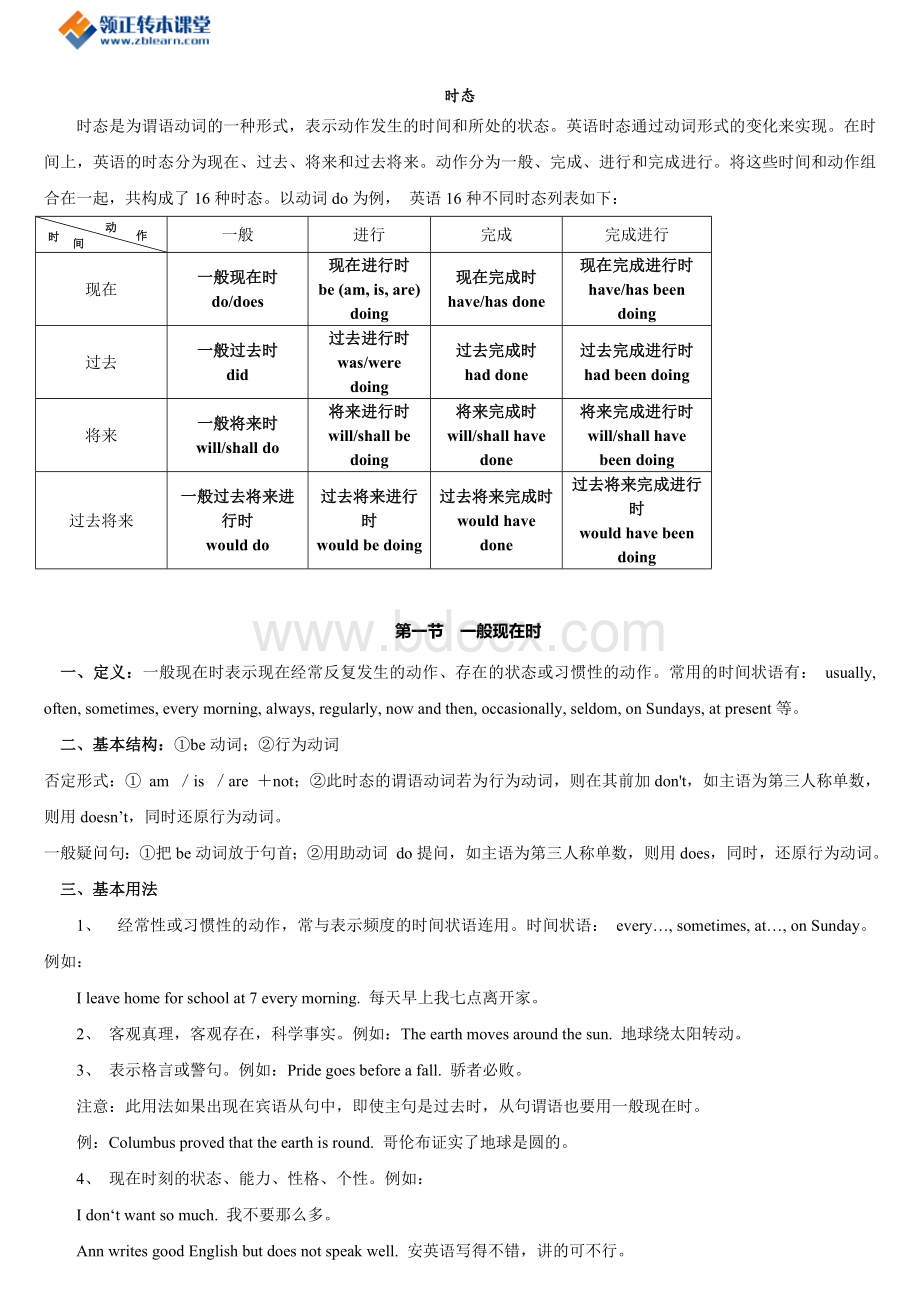江苏省专转本英语语法讲解及练习含答案Word文档下载推荐.doc
《江苏省专转本英语语法讲解及练习含答案Word文档下载推荐.doc》由会员分享,可在线阅读,更多相关《江苏省专转本英语语法讲解及练习含答案Word文档下载推荐.doc(144页珍藏版)》请在冰豆网上搜索。

do/does
现在进行时
be(am,is,are)doing
现在完成时
have/hasdone
现在完成进行时
have/hasbeendoing
过去
一般过去时
did
过去进行时
was/weredoing
过去完成时
haddone
过去完成进行时
hadbeendoing
将来
一般将来时
will/shalldo
将来进行时
will/shallbedoing
将来完成时
will/shallhavedone
将来完成进行时
will/shallhavebeendoing
过去将来
一般过去将来进行时
woulddo
过去将来进行时
wouldbedoing
过去将来完成时
wouldhavedone
过去将来完成进行时
wouldhavebeendoing
第一节一般现在时
一、定义:
一般现在时表示现在经常反复发生的动作、存在的状态或习惯性的动作。
常用的时间状语有:
usually,often,sometimes,everymorning,always,regularly,nowandthen,occasionally,seldom,onSundays,atpresent等。
二、基本结构:
①be动词;
②行为动词
否定形式:
①am/is/are+not;
②此时态的谓语动词若为行为动词,则在其前加don'
t,如主语为第三人称单数,则用doesn’t,同时还原行为动词。
一般疑问句:
①把be动词放于句首;
②用助动词do提问,如主语为第三人称单数,则用does,同时,还原行为动词。
三、基本用法
1、经常性或习惯性的动作,常与表示频度的时间状语连用。
时间状语:
every…,sometimes,at…,onSunday。
例如:
Ileavehomeforschoolat7everymorning.每天早上我七点离开家。
2、客观真理,客观存在,科学事实。
Theearthmovesaroundthesun.地球绕太阳转动。
3、表示格言或警句。
Pridegoesbeforeafall.骄者必败。
注意:
此用法如果出现在宾语从句中,即使主句是过去时,从句谓语也要用一般现在时。
例:
Columbusprovedthattheearthisround.哥伦布证实了地球是圆的。
4、现在时刻的状态、能力、性格、个性。
Idon‘twantsomuch.我不要那么多。
AnnwritesgoodEnglishbutdoesnotspeakwell.安英语写得不错,讲的可不行。
比较:
NowIputthesugarinthecup.把糖放入杯子。
Iamdoingmyhomeworknow.我正在做功课。
第一句用一般现在时,用于操作演示或指导说明的示范性动作,表示言行的瞬间动作。
第二句中的now是进行时的标志,表示正在进行的动作的客观状况,所以后句用一般现在时。
四、特殊用法
1.表示永恒的真理,即使出现在过去的语境中,仍用一般现在时。
如:
IlearnedthatlighttravelsfasterthansoundwhenIwasinprimaryschool.
2.在时间和条件状语从句中,代替一般将来时;
常用的引导词有:
时间:
when,until,after,before,assoonas,once,themoment/theminute,theday;
条件:
if,unless,provided.
Ifheacceptsthejob,hewillgetmoremoneysoon.
3.makesure(certain),seetoit,mind,care,matter+宾语从句,从句用一般现在时代替一般将来时。
Solongasheworkshard,Idon’tmindwhenhefinishestheexperiment.
只要他努力工作,我不介意他什么时候做完试验。
4.在themore…themore…(越……越……)句型中,若主句是一般将来时,从句通常用一般现在时。
Theharderyoustudy,thebetterresultsyouwillget.
小节自测题
1.IfBill________toNanjing,Iwillgotothestationtopickhimup.
AreturnBreturnsCwillreturnDisreturning
2.Theplane_______at9o’clock,butthereisafrostnow,soI’mafraidthatwehavetowaituntilagoodweather.
AtakesoffBwilltakeoffCistakingoffDtakeoff
3.Unlessit____finetomorrow,we’llputoffoursportsmeeting.
AwillbeBisCisbeingDbe
4.Theflowers______verygood,anddoyouknowitsname?
AtasteBistastingCaretastingDtastes
5.WhenIstudiedinaprimaryschool,myteachertoldusthatlight______farmorequicklythansound.
AwastravellingBtravelsCtravelledDistravelling
6.Ifshedoesn’ttellhimthetruthnow,hewillsimplykeeponaskingheruntilshe________.
AdoesBhasdoneCwilldoDwoulddo
Key:
BABABA
第二节现在进行时
现在时行时表示现在或现在这一阶段正在进行的动作。
常用时间状语有:
now,atthemoment,thesedays,nowadays,atpresent等。
二、基本用法:
1、表示现在(指说话人说话时)正在发生的事情。
Wearewaitingforyou.我们正在等你。
2、习惯进行:
表示长期的或重复性的动作,说话时动作未必正在进行。
Mr.Greeniswritinganothernovel.
他在写另一部小说。
(说话时并未在写,只处于写作的状态。
)
3、表示渐变,这样的动词有:
get,grow,become,turn,run,go,begin等。
Theleavesareturningred.叶子在变红。
It‘sgettingwarmerandwarmer.天越来越热了。
4、与always,constantly,forever
等词连用,表示反复发生的动作或持续存在的状态,往往带有说话人的主观色彩。
Youarealwayschangingyourmind.你老是改变主意。
Mydictionary___,Ihavelookedforiteverywherebutstill___it.
A.haslost,don‘tfindB.ismissing,don‘tfindC.haslost,haven‘tfoundD.ismissing,haven‘tfound.
答案D.前句是一个仍在持续的状态,应用进行时,由于没有找到,其影响仍然存在,应用完成时,瞬间动词用于否定式时可用于完成时。
三、动词在以下情况下不用于现在进行时的情况
1、表示事实状态的动词,如have,belong,possess,cost,owe,exist,include,contain,matter,weigh,measure,continue等。
Ihavetwobrothers.我有两兄弟。
Thishousebelongstomysister.这房子是我姐的。
2、表示心理状态的动词,如know,realize,thinksee,believe,suppose,imagine,agree,recognize,remember,want,need,forget,prefer,mean,understand,love,hate等。
Ineedyourhelp.我需要你的帮助。
Helovesherverymuch.他爱她很深。
3、瞬间动词,如accept,receive,complete,finish,give,allow,decide,refuse等。
Iacceptyouradvice.我接受你的劝告。
4、系动词,如seem,remain,lie,see,hear,smell,feel,taste,get,become,turn等。
Youseemalittletired.你看上去有点累。
第三节一般过去时
一般过去时表示过去某一时刻要段时间内发生的动作或存在的状态(包括习惯性动作)。
yesterday,lastweek,…ago,…later,in1980,during1980s等。
②行为动词
①was/were+not;
②在行为动词前加didn'
t,同时还原行为动词。
①was或were放在句首;
②用助动词do的过去式did提问,同时还原行为动词。
1)在确定的过去时间里所发生的动作或存在的状态。
时间状语有:
yesterday,lastweek,anhourago,theotherday,in1982等。
Wheredidyougojustnow?
刚才你上哪儿去了?
2)表示在过去一段时间内,经常性或习惯性的动作。
WhenIwasachild,Ioftenplayedfootballint